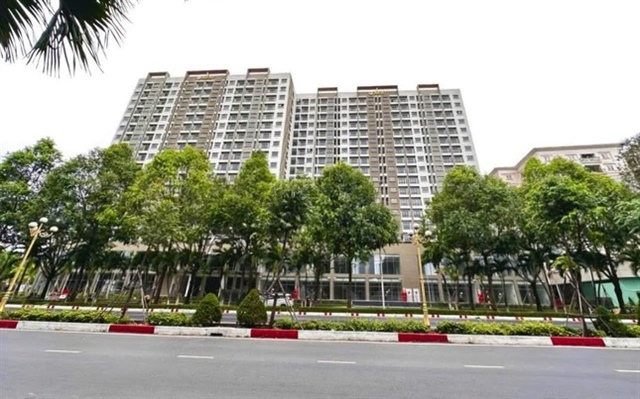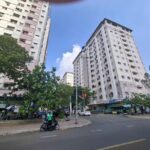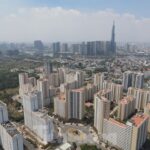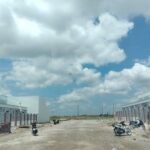The Dong Nai Construction Department has concluded its inspection of the implementation of legal regulations regarding the management, use, leasing, and purchasing of social housing in Bien Hoa City for four social housing projects: A6-A7 in Quang Vinh Ward, four blocks of apartments in Quang Vinh Ward, social housing in Tam Hoa Ward (now Binh Da Ward), and social housing in Buu Long Ward.
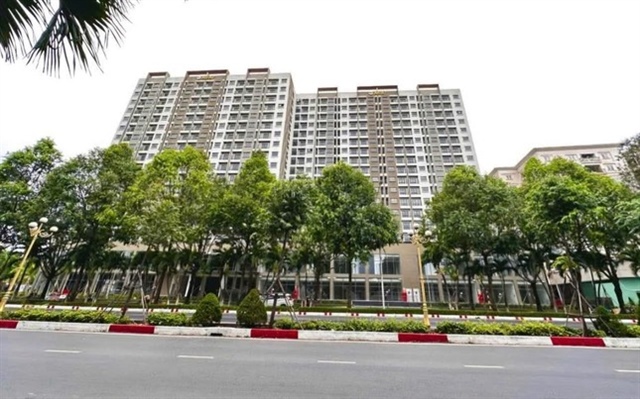
Social Housing Project A6-A7 in Bien Hoa City |
Out of the 716 apartments inspected at the four-block social housing project in Quang Vinh Ward, the inspection team found that 406 were occupied by eligible tenants, 23 were occupied by ineligible tenants, 270 were vacant, and 17 were empty.
At the A6-A7 Social Housing Project in Quang Vinh Ward, out of the 65 apartments inspected, 18 were occupied by eligible tenants, 47 were vacant, and no ineligible tenants were found. However, some apartments were found to be empty even though they had been handed over to the tenants. At the Social Housing Project in Tam Hoa Ward (now Binh Da Ward), out of the 97 inspected apartments, 54 were occupied by eligible tenants, 2 by ineligible tenants (including 1 occupied by a foreigner), and 41 were vacant.
At the Social Housing Project in Buu Long Ward, 36 apartments were inspected, with 27 occupied by eligible tenants, 1 by an ineligible tenant, and the rest vacant. Many residents had extended their balconies and installed awnings, protruding from the building and increasing the usable area.
Regarding the Housing Project for Low-Income Earners in Tam Hoa Ward (now Binh Da Ward), the developer sold 100% of the apartments, so the team did not inspect the tenants’ eligibility for leasing or purchasing.
According to the inspection team, the developers have largely completed the construction and handed over a significant number of social housing units to the people as per the regulations, addressing the housing needs of policy beneficiaries and low-income individuals. However, there are still limitations and issues, including cases of ineligible tenants, which reduce the opportunities for truly eligible individuals to access social housing, contradicting the policy’s objectives.
Out of the 914 cases inspected, 366 reported being absent despite prior notification, making it challenging to verify compliance with regulations. Additionally, 17 apartments were found to be vacant or in the process of being returned, leading to a waste of social housing resources.
Many residents violated regulations regarding the use of common areas and safety of the structures, with issues such as parking vehicles in common areas, affecting aesthetics, hygiene, and fire safety, as well as potentially compromising the structural safety and causing discontent among the residents.
Based on the inspection results, the Construction Department proposed that the Provincial People’s Committee direct the relevant authorities, local governments, and developers to strictly implement the inspection team’s recommendations.
Based on the verified cases of ineligible tenants, the Construction Department proposed that the Provincial People’s Committee consider issuing decisions to retrieve the apartments in accordance with regulations. Additionally, the department proposed that the committee consider their suggestion regarding the leasing and sales of vacant social housing units as per current regulations.
Furthermore, in the conclusion, the team also proposed that the committee direct the departments, sectors, and localities with cases of civil servants occupying social housing units and not cooperating well with the inspection team to conduct criticism and self-criticism. They also recommended coordinating with the Construction Department and the social housing project developers to establish a list of individuals who no longer wish to occupy the units and propose reallocating them to eligible individuals.
Manh Thang
– 14:47 29/04/2025
“Revolutionizing Social Housing Investments: Slashing Processing Times by 70%”
The government has proposed a 70% reduction in processing time for social housing projects, expediting project development and answering the long-awaited calls of both businesses and citizens.
How Many Social Housing Units Did Ho Chi Minh City Complete in 2025?
In 2025, Ho Chi Minh City is set to complete 2,316 apartment units, with an additional 8 projects expected to break ground, offering approximately 8,000 residences. Moreover, 5 projects, encompassing roughly 20,000 housing units, are anticipated to gain investment approval.

